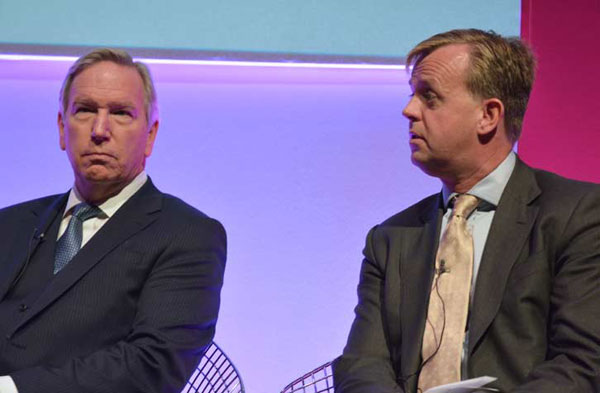✕

Column: industry Tag: UK hoteliers,The United Kingdom hotel market,clarity Published: 2017-10-26 11:41 Source: Author:

James Houlston (right), of BH Investment Group, told Peter Till, of Choice Hotels International, and attendees of the Annual Hotel Conference that “quite often the value of development does not reach the same level as the cost of development.” (Photo: Terence Baker)
MANCHESTER, England—The United Kingdom hotel market remains vibrant, but moving forward, success will come only to those who approach new projects with vision and clarity across all touchpoints, sources said.
Panelists who spoke during the recent Annual Hotel Conference’s “Hunting high and low: The opportunities are still out there, you just need to know where to look” session agreed there are hotel development opportunities if the end product is adding something well-structured and fresh.
“Rather flippantly put, there are opportunities everywhere (in the U.K.), but you have to see them from all angles of risk appetite,” said Richard Candey, senior director and head of Europe, Middle East and Africa hospitality at Cushman & Wakefield. “Future pipeline is relevant, but in all major markets, yes, there are opportunities.”
Peter Till, managing director of the U.K. at Choice Hotels International, said he is looking at the market from the viewpoint of bringing existing product under his company’s umbrella.
“We look at the specifics of each market in terms of rebranding opportunities, so that would not mean a worry about supply curve,” he said.
Panelists used the word “opportunities” quite often during the discussion.
“There are opportunities in finding suitable office buildings for conversion, to see where you can create value,” said Lissa Engle, director at investment consultancy Berkeley Capital.
But that doesn’t mean there are no development obstacles, the panelists said.
“Some sub-regional locations are challenging,” said James Houlston, partner at BH Investment Group. “Unbranded projects are struggling to get finance.”
Till said such projects need a story.
“A loan on a new build is a challenge, and having a brand helps,” he said. “There are a lot of challenges and thresholds to getting loans. You need a project that ticks all the right boxes, and projects linked to other things work, such as shopping centers, stadiums. They take longer, of course, and (are) more expense.”
Steve Lacey, director of hotels at chartered quantity surveyor Gleeds, agreed that investors are being very careful with their capital.
“There are some vanilla deals, but very few,” he said.
Engle underlined the need for development discipline, especially with many if not all of the good sites gone.
“If reconfiguring buildings, adding floors, modifying … look at the planning process and understand timescales,” she said. “Look at the (return on investments) constantly and what you can do to create value while keeping it all within parameters.”
Engle said the work does not end there. The pre-application process is critical to identifying sticking points, and teamwork remains critical.
“Use advisors who already know (your) building. They know the red flags,” she added.
Houlston said it helps to hire a strong planning consultant who deals with planning committees regularly.
“It is not enough just to have an architect,” he said. “They can get too emotionally involved.”
It is just getting more expensive?
Panelists said it’s now critical to put in place a robust feasibility plan and the right cash flow.
“It is amazing how many times you see ill-defined cash flows,” Houlston said.
When bringing new hotels to market, it’s necessary to have a definite idea as to their worth, panelists added.
“Quite often the value of development does not reach the same level as the cost of development,” Houlston said.
That doesn’t change if branding is attached to a project.
“Even with the established chains, new brands do have fuzzy standards, and when you are working on timelines, deals can fall through the cracks,” Engle said. “Get all the information from the offset, as that can take time.”
“If you are a new brand, put your own brand money in. I have been pushing this, but not all the brands are listening,” Candey said, adding that his company will complete a deal in November to bring the Soho House brand into a site in White City, London, owned by the BBC.
“Complexities involved the site being a sprawling mess of 1950s and 1960s buildings, and the BBC still keeping some space,” he said. “Soho House was a perfect fit because we could negotiate a long-term lease and a package for an exit. … Uncertainty derives from ascertaining whether it would add value. With that project, the sales velocity on residential sales was three times higher than what we thought.”
Engle spoke of the challenge of injecting capital from a specific private equity firm into the hotel industry for the first time, which is only possible if its investors fully understand the project, she said.
“It is about balance and being flexible and then aligning (all partners) to make sure the timing is right,” she said. “For example, in one project, we had a plumbing issue, which added 10% to cost, so we needed to add more keys.”
Creativity is key when it comes to how capital ends up in a project, Candey said.
“It is all the ROIs of all investors,” he said. “We are very fortunate in the U.K. as we have so much and so varied capital wishing to invest here. Understand that capital, and their risk appetite, and the exits.”
Previous:Las Vegas Sands Reports Third Quarter 2017 Results
Next:Wyndham execs warn of longer-term hurricane effects
Hot key words
Hot Products
Popular Vendors